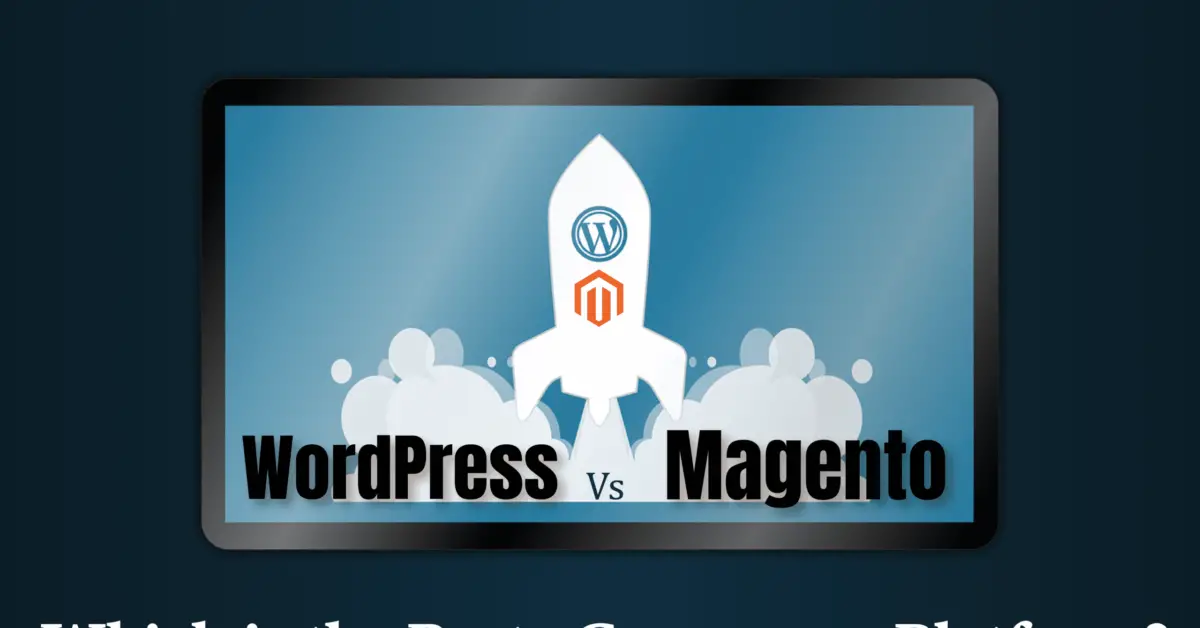There are dedicated eCommerce Content Management Platforms and there are Content Management Systems that aren’t dedicated to anything in particular. An example of the former is Magento and the latter is WordPress. WordPress and Magento are both open-source platforms that don’t require any upfront payment.
WordPress is a regular Content Management System (CMS) that functions as an eCommerce store with the use of some select specific plug-ins. These plug-ins work to transform a regular WordPress CMS into a complete eCommerce Management System.
Magento was built with eCommerce in mind. Its sole purpose is for the creation of online stores.
In this article, we’re going to pit WordPress vs Magento to see which the best eCommerce platform is.
WordPress Vs Magento: What is the Difference?
Continuing from the previous paragraphs, Magento and WordPress are both great open-source platforms, although they’re not necessarily the same.
As mentioned earlier, Magento was built strictly for online stores and the running of it. WordPress, on the other hand, can support an unlimited number of platforms and but cannot support eCommerce platforms on its own. But with the help of plug-ins, your WordPress website can function as well as any other eCommerce platform.
WordPress and Magento function similarly, (with the help of an eCommerce plugin for WordPress, i.e.) both can handle regular website pages, products, shopping carts, order history, customer accounts, etc.
The same way you need a plugin to turn your WordPress website into an eCommerce store is how you’d also need a plugin to add a blog section to your Magento website.
Interestingly, if you want a WordPress blog on your Magento website, all you need to do is install the WordPress plugin to your eCommerce website.
WordPress Vs Magento from a Development Perspective
Magento is a lot more complicated compared to a regular WordPress website. If you don’t have any coding knowledge, you may get frustrated if you decide to start your eCommerce store with Magento. Magento was built with scalability in mind. Some eCommerce platforms don’t scale well. This is not a worry for Magento. Magento was built with enterprise-level eCommerce platforms in mind.
On the other hand, for WordPress to have the same functionality that comes in-built with Magento, you’d need a lot of plug-ins to make this a reality. Regardless of this, WordPress is the solution if you don’t code and want to create an eCommerce platform right off the bat. One of the concerns with installing plugins on your WordPress website is that your entire website can be at the mercy of any plugin. And if a plugin acts up, it could take days or weeks to figure out the problem and get your site up and running again.
Whichever decision you make depends entirely on your vision for your eCommerce website and your brand at large. If you’re interested in building a place for your products and creating a solid eCommerce store only, Magento would be a great option.
If you’re interested in selling products and have plans for a robust content marketing system, you may want to skip on Magento.

Magento Vs WordPress on Security and Hosting
When choosing an eCommerce Content Management System, security is one of the most important things to consider. While neither of them is entirely secure, they both have distinct security features.
Magento is constantly updating patches to ensure its security is up to date. The only downside to this is that you have to install these patches manually and the process can become complicated very quickly. Magento also has over 700 security apps in its marketplace. While some of these apps are free, others can be as cheap as $25 and as expensive as $8000.
WordPress, on the other hand, has also put a lot of things in place to ensure the security of its website. To protect WordPress websites, WordPress is constantly updating its code to ensure any security risk is being fixed. But unlike Magento, WordPress automatically installs the updates.
WordPress also offers a lot of security plugins that are either free or nowhere as expensive as Magento’s.
When it comes to hosting, on Magento you have two options. To use their cloud hosting service or go self-hosting. WordPress also offers the same options. You can decide to host your eCommerce website on WordPress.com or host your websites on WordPress.org.
How Can CRM Integrations Level up Your eCommerce Business?
WordPress Vs Magento on Pricing
Both Magento and WordPress are open-source software. This means they’re free to download. To launch your store, on the other hand, would require various payments such as domain registration, hosting, premium themes, plug-ins or add-ons you may want to include. The price of hosting and domain registrations depends entirely on your choice.
Let us take a deeper delve into the functionalities that may cost you money.
Magento
With Magento, themes, plug-ins, apps or developers are usually more expensive compared to WordPress.
Magento offers free themes but they’re lacking in design and functionality. Hence, you may need to install third-party themes. Premium themes can range anywhere from $20 to $500 with the bulk of them being about $75-$99.
Magento also offers a range of apps that take eCommerce up a notch. There are at least 4000 apps available in the Magento marketplace. Of those 4000, over 1000 are free. Others range from $25 being the cheapest to $15,000. Don’t fret, most of their apps are within the range of $30 to $300
WordPress
WordPress has over 4000 free themes. Although, to serve your exact aesthetic and functional purpose, you may need to purchase a premium theme. And WordPress themes usually cost around $60 to $200.
WordPress has over 55,000 free plugins. To get the desired eCommerce functionality, you’ll need to install several plug-ins. The good part is that most of these plugins are free.
8 Important eCommerce Shipping Considerations – A Startup Guide
Magento Vs WordPress on SEO
Most eCommerce stores rely solely on paid ads or social media to drive traffic to their website. But you can optimize your website to drive more organic traffic to your eCommerce store. Let’s compare which eCommerce Content Management System performs better in terms of SEO.
Magento for SEO
There’s a lot of practices you could use to optimize your Magento store better for search engines. Some of these include choosing a responsive theme, including meta description and tags to all product pages, not neglecting alt text for images, getting rid of duplicate content. Additionally, set your Checkout, my account, cart and admin pages to “no follow”.
For users who are technical and are well versed in SEO techniques and practices, Magento is a great choice.
WordPress SEO
With WordPress, everything done for Magento should be done as well (choosing a responsive theme, including meta description and tags to all product pages, not neglecting alt text for images, getting rid of duplicate content. Additionally, setting your checkout, my account, Cart and admin pages to “no follow”).
What sets WordPress apart from Magento is that with WordPress, you’re open to a wide array of SEO tools, extensions and plug-ins. Also, you can edit any part of your website’s underlying code. If you’re technical and understand code, you can edit and take out any unnecessary unit that regular users wouldn’t be able to.
Major Differences between Magento and WordPress
Both Magneto and WordPress are great options for creating an eCommerce store. Here’s a quick rundown of the key differences between WordPress and Magento.
| Magento | WordPress | |
| Development Point of View | Was built for eCommerce so it comes premade with most eCommerce tools. Also, owners will need technical expertise to effectively operate and build the website. | WordPress isn’t built for any specific purpose. Hence, to operate as an eCommerce store, you’d need plug-ins and extensions. Also, with WordPress, you don’t need a lot of technical knowledge to operate it. |
| Security | Does not have built-in features so you may need additional security extensions, most of which are expensive. Magento rolls out security updates regularly but they have to be installed manually and can be difficult to install. | Does not have built-in security features so you may need additional security plug-ins, most of which are free. WordPress rolls out security updates regularly but they’re auto-updated |
| Pricing | Free to use, but you pay hosting and domain associated costs. Premium themes are not free like WordPress. Developers are expensive. | Free to use, but you pay hosting and domain associated costs. Premium themes are not free, the same as Magento. Developers are a lot cheaper than Magento. |
| SEO | Applies regular SEO practices such as getting rid of duplicate content. Additionally, setting your Checkout, My Account, Cart and Admin pages to “no follow”, etc. | Also applies regular SEO practices such as getting rid of duplicate content. Additionally, setting your Checkout, My Account, Cart and Admin pages to “no follow”, etc. You can also edit your source code or select from hundreds of SEO plugins. |
Conclusion
In this article, we have listed all the pros and cons associated with both Magento and WordPress websites. It is left to you to choose which best aligns with your brand.





